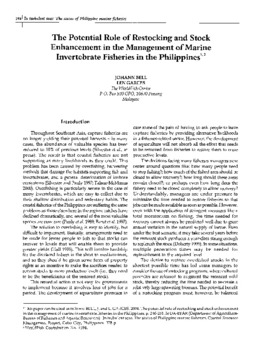The potential role of restocking and stock enhancement in the management of marine invertebrate fisheries in the Philippines
Abstract
Throughout Southeast Asia, capture fisheries are no longer yielding their potential harvests - in many cases, the abundance of valuable species has been reduced to 10% of previous levels (Silvestre ef al., in press). The result is that coastal fisheries are not supporting as many livelihoods as they could. This problem has been caused by overfishing, harvesting methods that damage the habitats supporting fish and invertebrates, and a general deterioration of inshore ecosystems. The solution to ovehhing is easy to iden*, but dficult to implement. Basically, arrangements need to be made for fewer people to fish so that stocks can recover to levels that will enable them to provide greater yields. This will involve hardship for the displaced fishers in the short to medium-term, and so they should be given some form of property rights as an incentive to make the sacrifices needed to restore stocks to more productive levels. This remedial action is not easy for governments to implement because it involves loss of jobs for a period. The development of aquaculture promises to ease some of the pain of having to ask people to leave capture fisheries by providing alternative livelihoods in a fisheries-related sector. However, the development of aquaculture will not absorb all the effort that needs to be removed from fisheries to restore them to more productive levels

